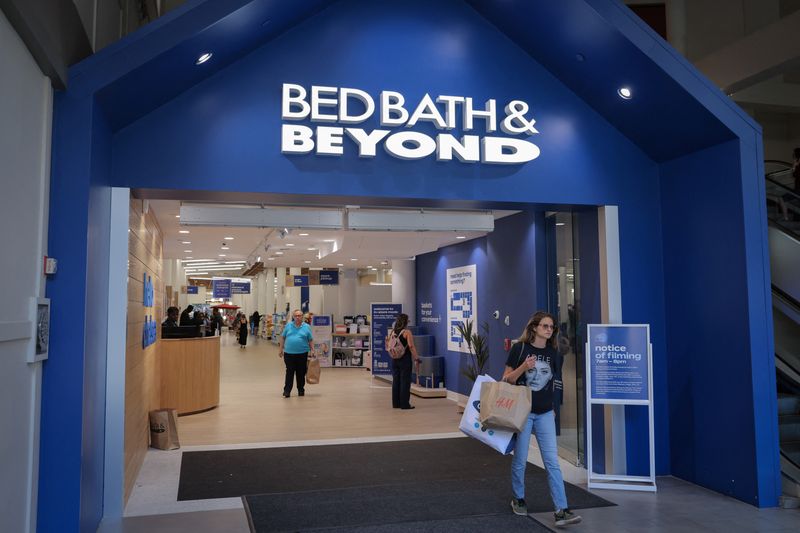NEW YORK (Reuters) - Storied home goods chain Bed Bath & Beyond (NASDAQ:BBBY) is preparing for bankruptcy in coming weeks following a run of poor sales, sources told Reuters last week.
A bankruptcy would add to a list of high profile collapses of retailers who struggled, especially during the pandemic, to compete with big-box retailers and online buying.
Ten of the biggest bankruptcies over the past 5 years are listed below by assets and liabilities at the time of their filings:
Ascena Retail Group (OTC:ASNAQ)
Assets: $13.69 billion
Liabilities: $12.52 billion
Stores: More than 2,800
The owner of Ann Taylor, Lane Bryant and Loft filed for Chapter 11 bankruptcy protection in July 2020, then sold off its Justice children's apparel unit and closed all Catherines stores. The company is now a part of Premium Apparel LLC, a unit of private equity firm Sycamore Partners, after being acquired for $540 million in November 2020.
Sears Holdings Corp
Assets: $7.26 billion
Liabilities: $10.99 billion
Stores: About 700
Once the nation's largest retailer, the 125-year-old chain filed for bankruptcy in October 2018, following a decade of revenue declines, hundreds of store closures. It had not turned a profit since 2011 and stayed afloat for years thanks to billions of dollars provided by its billionaire CEO Eddie Lampert. Ultimately, it succumbed to stiff competition from chains like Walmart (NYSE:WMT).
J.C. Penney
Assets: $7.99 billion
Liabilities: $7.16 billion
Stores: 846
After more than a century in business, the department store chain filed for bankruptcy protection in May 2020, weighed down by mounting debt.
After months of bankruptcy proceedings, the company averted liquidation, after a U.S. judge ruled in November that year to let it continue under new owners - Simon Property Group (NYSE:SPG) and Brookfield Asset Management - in a bid to save over 60,000 jobs.
Toys "R" Us
Assets: $1 billion-$10 billion
Liabilities: $8.07 billion
Stores: more than 1,600
The largest U.S. toy store chain and owner of Babies "R" Us, filed for bankruptcy protection in late 2017, straining under a $2.5 billion debt pile. At the time, its bankruptcy was the biggest collapse of a U.S. retailer by assets since Kmart in 2002.
Neiman Marcus
Assets: $7.55 billion
Liabilities: $6.79 billion
Stores: Nearly 70
The U.S. luxury department store chain laden with debt after a private equity takeover filed for bankruptcy protection in May 2020. The nearly 113-year old chain's CEO blamed the "unprecedented disruption" caused by the pandemic.
It emerged from bankruptcy months later after its restructuring eliminated more than $4 billion of debt.
J. Crew Group Inc
Assets: $1.59 billion
Liabilities: $2.95 billion
Stores: 491
Chinos Holdings, parent of the apparel chain, filed for bankruptcy protection in May 2020 with a plan to eliminate $1.65 billion of debt in exchange for ceding ownership to lenders. J Crew, known for its preppy clothing favored by former first lady Michelle Obama, was the first major retail casualty of the pandemic. It soon emerged from bankruptcy with much of its store base intact and $400 million in fresh financial aid.
Tailored Brands (OTC:TLRDQ)
Assets: $2.48 billion
Liabilities: $2.84 billion
Stores: Over 1,400
The owner of tuxedo and business suit chain Men's Wearhouse filed for bankruptcy in August 2020. It emerged from bankruptcy in December that year, after eliminating $686 million of debt.
Claire's Stores
Assets: $2 billion
Liabilities: $2.52 billion
Stores: About 1,600The jewelry retailer filed for Chapter 11 in March 2018, hit by a sharp drop in mall traffic as shoppers shifted online. The company emerged from bankruptcy in October 2018 after eliminating $1.9 billion in debt and then filed to go public again in late 2021, backed by Goldman Sachs (NYSE:GS).
Nine West Holdings Inc
Assets: $988 million
Liabilities: $1.94 billion
Stores: About 70

The U.S. fashion company, owner of Anne Klein and Gloria Vanderbilt, filed for bankruptcy in April 2018, squeezed by online competition. It emerged from bankruptcy just days short of a year since it filed for bankruptcy under a new name, Premier Brands.
Source: Compiled by New Generation Research's BankruptcyData.com and from court filings and news reports